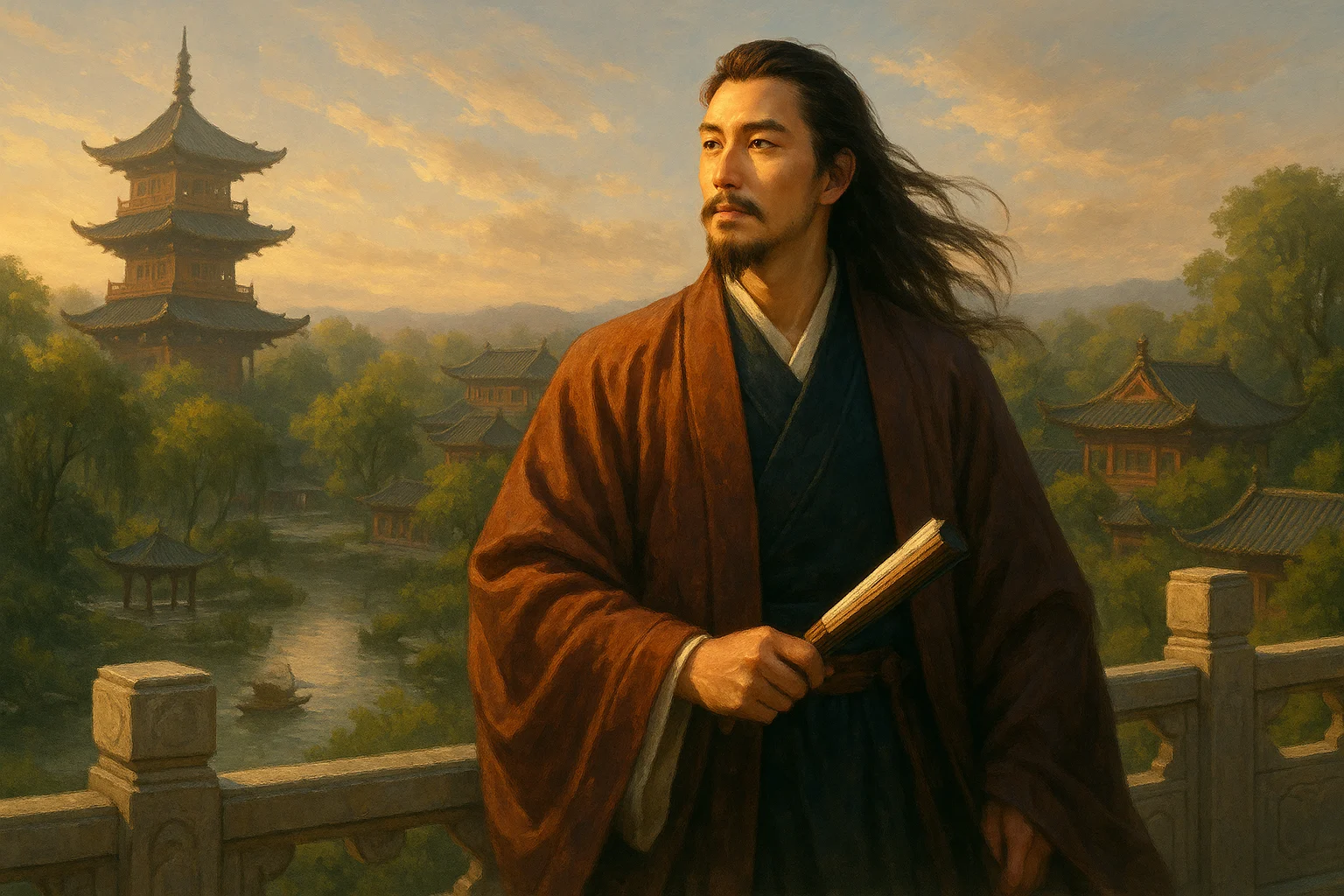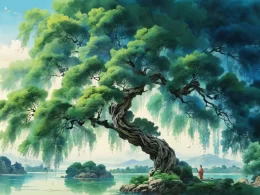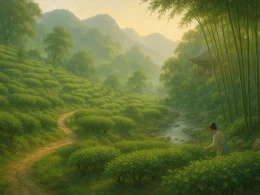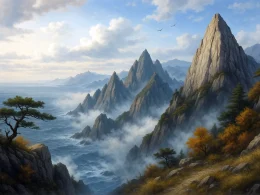Wild crabapples tousled by the shore,
What blossoms match this floral roar?
The moon spills icy silver threads,
Fragrance drifts where the far bank spreads.
Golden orioles pipe nearby,
Their calls splice the river's sigh.
I lounge on moss's velvet seat,
Sipping wine with petals at my feet.
Original Poem
「菩萨蛮 · 海棠乱发皆临水」
海棠乱发皆临水,君知此处花何似。
凉月白纷纷,香风隔岸闻。啭枝黄鸟近,隔岸声相应。
王安石
随意坐莓苔,飘零酒一杯。
Interpretation
This lyrical poem was likely composed during Wang Anshi's later years of retirement at Zhongshan. After the failure of his political reforms, Wang gradually withdrew to a reclusive life in nature, and his poetic style transformed from its earlier austerity to a more delicate and refined quality. Through exquisite natural imagery and subtle emotional expression, this short lyric reveals the poet's leisurely retired life and his inner contemplations. Connecting imagery of flowers, moonlight, fragrant breezes and birdsong, it paints a picturesque scene with lingering sentiment - a rare example of Wang's graceful and restrained style among his poetic works.
First Stanza: "海棠乱发皆临水,君知此处花何似。凉月白纷纷,香风隔岸闻。"
Hǎitáng luàn fà jiē lín shuǐ, jūn zhī cǐ chù huā hé sì. Liáng yuè bái fēnfēn, xiāng fēng gé àn wén.
By water's edge the wild crabapples riotously bloom; / Have you seen spring's full splendor assume this guise? / The cool moon sheds its pearly flakes in snowy plume, / While fragrant breezes cross the shore before our eyes.
This stanza blends scenic description with rhetorical questioning to draw readers into its world. "Wild crabapples riotously bloom" captures both the flowers' luxuriance and a delicate sense of movement. The question "Have you seen…" not only serves as transition but intensifies the lyricism. Cold moonlight scattering like snow and the fragrance carried across the water create a tranquil yet resonant night scene through interwoven visual and olfactory imagery. Here nature's beauty - flowers, moon and fragrance - becomes both the subject and a mirror of the poet's mind.
Second Stanza: "啭枝黄鸟近,隔岸声相应。随意坐莓苔,飘零酒一杯。"
Zhuàn zhī huáng niǎo jìn, gé àn shēng xiāngyìng. Suíyì zuò méi tái, piāolíng jiǔ yī bēi.
Golden orioles warble on nearby boughs, / Their songs answered across the way. / At random on mossy turf I drowse, / Sipping wine as petals drift away.
This stanza portrays human harmony with nature through balanced dynamics. The orioles' calls echoing across the water symbolize nature's concord while subtly reflecting the poet's spiritual connection with the world despite his seclusion. "At random on mossy turf" conveys serene contentment, while "sipping wine as petals drift" carries a tinge of melancholy - both intoxication with natural beauty and metaphor for life's transience. The fleeting "petals drift" image, lightly touched upon yet profoundly resonant, hints at the passage of time and fading youth.
Holistic Appreciation
This ci poem constructs a spring night waterscape through imagery of crabapple blossoms, cool moonlight, fragrant breezes, and birdsong. The opening line "crabapple blossoms in disarray" vividly evokes visual sensations—the flowers resembling a beauty’s tousled hair, their reflections trembling on the water, delicate and enchanting. The rhetorical question in the following line immerses readers in the scene, where blooming splendor and wind-borne fragrance enrich the picturesque allure.
The second stanza merges soundscape with human presence. Orioles calling in dialogue portray nature’s vivacity while mirroring the poet’s quietly stirring mood. The closing lines—"sitting at will on mossy stones" and "a cup of wandering wine"—reveal his leisurely, detached outlook, tinged with faint solitude and life reflections. Unadorned yet profound, the poem’s fresh, unworldly conception and relaxed structure showcase a rare softness in Wang Anshi’s ci style.
Artistic Merits
- Ethereal Naturalism in Scenery
Sensory depictions like "cool moonlight scattering white" and "fragrant breeze wafting across shores" create an exquisite interplay of warmth and chill, movement and stillness. - Scene-Emotion Fusion, Subtle Feeling
Landscapes serve as emotional vessels: blossoms, birds, moon, and wine reflect inner sentiments—gentle yet far-reaching, perfectly measured. - Question as Meditation, Philosophical Depth
"Do you know what these flowers resemble?" elevates beauty-sharing to timeless contemplation of life’s transience. - Concise Language, Resonant Ambiguity
Sparing diction carries weight. "A cup of wandering wine" blends three parts nonchalance, three parts melancholy, and four parts transcendence, elevating the poem’s realm.
Insights
Through exquisite nature portrayals, this work conveys the poet’s serenity after life’s upheavals. It celebrates nature while contemplating time—amid blossoms and moonlight, observing things prompts self-reflection. The poem teaches us: in turbulent worlds, preserve a space for clarity—to hear birdsong, smell flowers, and behold the moon. Befriending nature and cherishing quiet joy constitute an alternative way of being.
About the Poet

Wang Anshi (王安石 1021 - 1086), a native of Linchuan in Jiangxi, was an outstanding statesman, writer, and thinker of the Northern Song Dynasty, counted among the "Eight Great Prose Masters of the Tang and Song Dynasties." His poetic achievements were particularly profound—his early works, filled with heroic language, revealed the ambition of a reformer. Though his ci poetry was few in number, it pioneered new realms of historical reflection. His poetry and prose combined intellectual depth with artistic value, and the over 1,500 works preserved in The Collected Works of Linchuan stand as a monumental testament to literary innovation in Song Dynasty literature.












